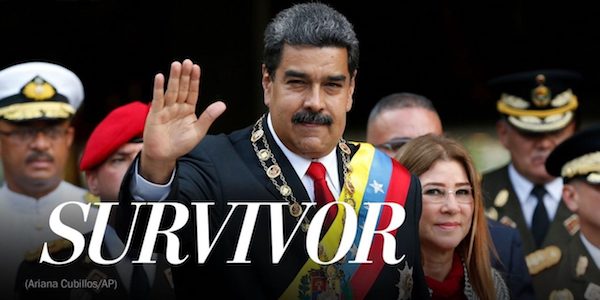A Washington Post article by Ishaan Tharoor (9/10/18) states that it “can be plausibly argued” that Venezuela is “a threat to the world.” The justification for the remark is unclear, but seems to be based on his claim that a,
Hemispheric humanitarian calamity is now straining Venezuela’s neighbors, who are struggling to cope with the vast influx of refugees fleeing hunger and depredation.
The phrase “a threat to the world” has a hyperlink to an earlier Tharoor piece (3/1/18), which includes the claim, “As many as 4 million Venezuelans—more than 10 percent of the population—have already left the country, according to the Brookings Institution,” and goes on to assert,
That displacement threatens to create problems beyond Venezuela’s borders.
If you follow the link to Brookings, you see that the think tank (2/12/18) only says, “Some estimates suggest that there are already 4 million Venezuelans who have left the country in search of better living conditions: over 10 percent of the country’s population.” No source is offered beyond “some estimates.”
I’ve written recently on the scale of Venezuela’s migration (FAIR.org, 8/31/18), given the comparisons to Syria that Tharoor and others have tossed around. According to the UN’s International Organization for Migration figures, by July 2018, about 1.6 million Venezuelans had fled its economic crisis, far from the 5 million that have fled Syria’s civil war to live abroad, and whom no decent person would call a “threat to the world.”
The UNHCR has appealed for $46 million to offset the costs of the exodus from Venezuela’s economic depression to its neighbors. That’s 0.006 percent of the recently approved Pentagon budget. Threat to the world? Unless you accept Trump’s racist logic that Mexico poses a “threat” to the United States because of the millions who have fled poverty there, then Tharoor’s remark is not only preposterous but offensive.
Trump’s policy has been to deliberately make Venezuela’s economic crisis worse, which makes its migration crisis worse. In August 2017, as U.S. economist Mark Weisbrot (The Hill, 8/28/17) explained, Trump imposed sanctions—illegal under various treaties the U.S. has signed—that
do their damage primarily by prohibiting Venezuela from borrowing or selling assets in the U.S. financial system. They also prohibit Citgo, the US-based fuel industry company that is owned by the Venezuelan government, from sending dividends or profits back to Venezuela.
According to Reuters (9/14/17), Citgo had been sending about $1 billion per year back to Venezuela before Trump’s sanctions cut off that flow of revenue —about 20 times more than what the UNHCR has asked for to help Venezuelan migrants. That’s the easiest cost of the sanctions to estimate. The other costs come from gravely impeding Venezuela’s capacity to restructure its debt, which is crucial to any recovery. U.S. clout stems from the fact that all Venezuela’s foreign currency bonds are governed under New York state law.
Amazingly, the closest Tharoor’s article came to saying anything about Trump’s draconian sanctions—which could be made even more devastating through the imposition of an oil embargo, a move that is made more likely by a deluge of articles like his—is when Tharoor mentioned a travel ban:
President Trump, meanwhile, has played the part of the hectoring American hegemon rather well. His administration included Venezuela among the mostly Muslim-majority countries targeted by Trump’s travel ban, shutting the door to a nation in desperate need.
I asked the Washington Post to correct Tharoor’s article so his readers are not left completely ignorant of Trump’s economic sanctions on Venezuela, and worked up into a panic about a democracy that poses them no threat. Notwithstanding Dean Baker’s struggles to get basic facts reported accurately in the Post when elite agendas are served by “mistakes,” I hope others also ask the paper to show a semblance of honesty.

